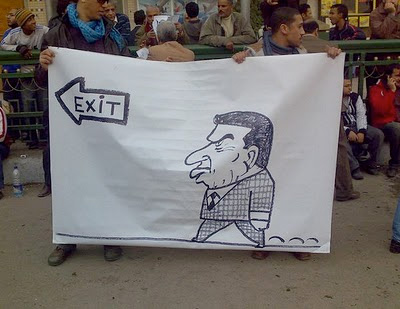
Is the drama unraveling in Egypt today a sequel to the one that began in Iran in 1979?
This is the question of the hour. In article after article, interview after interview, the experts list their reasons why Egypt is following a script of its own. They reassure the audiences by pointing to everything that distinguishes the unfolding uprising from its regional predecessor. But what goes unmentioned is that Iran’s 1979 revolution appears decidedly theocratic only from the vantage point of thirty years. At the time, when religious and secular, villagers and urbanites, educated and illiterate, all equally angrily, were throwing their fists into the air and demanding the removal of the Shah, Iran’s future was as unknowable then as Egypt’s future is today.
And yet, I, too, believe that Egypt ought not to be compared with Iran. That the comparison is wrong needs no factual support beyond citing the sheer absurdity of it. It’s one made to assuage the anxieties of Westerners who would never make a similar comparison between Bastille Day and the English Revolution because the fact that the French and the British are two entirely different people would need no factual backing.
Still, today’s democratic forces in Cairo’s Tahrir Square can learn from the democratic forces in Tehran’s Azadi Square in 1978. Nations and their distinct histories are not interchangeable. But movements striving for common democratic goals have consistently exchanged the lessons of their struggles to inform and warn their comrades elsewhere against pitfalls. Here are some of the errors Iran’s democratic forces (to use the term loosely and generously) made in 1978, in the weeks leading to the fall of the Shah:
(1) They blindly embraced a union with the religious opposition, having been perfectly disarmed by them. When the Ayatollah said that he had no political ambitions, and that, once the Shah was gone, his only wish was to hunker down with a Koran at a seminary in Qom, everyone believed him. When he spoke against the violations of human rights in Shah’s prisons, the intellectuals called him their homegrown Gandhi brand. When he talked of gender equality and women’s rights, he was hailed unequivocally as if he’d been the heir to Gloria Steinem and Betty Friedan. In short, before its rise to power, the religious opposition, headed by the Ayatollah, told Iranians what they wished to hear and Iranians believed what they were told.
(2) The few who were smart enough not to believe the Ayatollah made the common mistake smart people often make — underestimating the intelligence of others. They were confident that they could outmaneuver the Ayatollah. The Western-educated, stylishly-suited secular leaders assumed themselves far too sophisticated to be outwitted by the plainly-dressed provincial clerics.
(3) They did not realize that keeping the movement peaceful and nonviolent was detrimental to keeping themselves relevant and credible. Once the army had opened fire and the first victims had fallen, the religious co-opted the movement. The seculars had no substantive plans for retaliation or political comeback in light of a military attack. But the shedding of blood was the cue for the religious to enter the stage and move into the spotlight. When it came to death, the religious had a full lexicon and complete repertoire of rituals to balance the strategic shortcomings of their secular counterparts. After all, death and all of its conceptual by-products, chiefly martyrdom, had historically been their proverbial bread and butter, the spring of their livelihood.
(4) They became overambitious and gave into globalistic hubris with the first small tactical victories. Freedom for Iranians, employment and education for the youth, or the implementation of civil liberties were no longer enough. Uncle Sam and his bastard child, Israel, had to also be uprooted. Once they shifted their focus from domestic issues, they had empowered the religious once again. Within months after the fall of the Shah, Iraq attacked Iran and the Ayatollah dragged the nation into a decade of destruction because, he argued, the quickest way to annihilating the world’s two greatest evils was through conquering Baghdad en route to Jerusalem. Tehran, and its residents, did not satisfy the grand agenda.
(5) They made concessions on issues that they had to remain uncompromising about. Instead of remaining wholly committed to the pursuit of their dreams, they made compromises and bought into piecemeal, gradual, interim dreams. To successfully overthrow the monarchy and protect against its return, women were told to defer their demands for equal rights. If attorneys questioned the mistreatment of the religious minorities, say the Bahai, they were accused of being unpatriotic at a time when the nation, a brand-new republic, was too tender to withstand criticism.
In short, the religious opposition was too smart to be outwitted by the secular. It made no claim to power until it had fully seized it — a quest fueled by bloodshed and extraterritorial ambitions. And it began its encroachment on the rights of the majority by first denying and encroaching upon the rights of the most marginal and vulnerable Iranians.
These are a few of the painful lessons of a movement that was derailed, a movement that is still ongoing. May they, in their own small way, help light the way of the Egyptians in their own struggle for freedom.
First published in worldaffairsjournal.org.
AUTHOR
Roya Hakkakian is a fellow at Yale University’s Whitney Humanities Center. She is a founding member of the Iran Human Rights Documentation Center and serves on the board of Refugees International >>>






